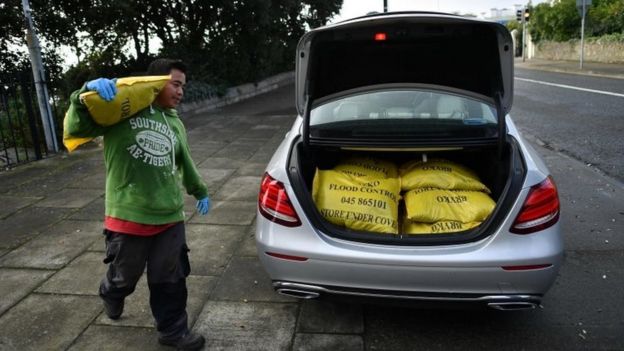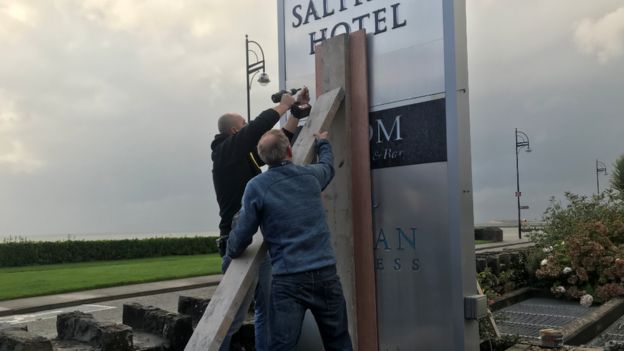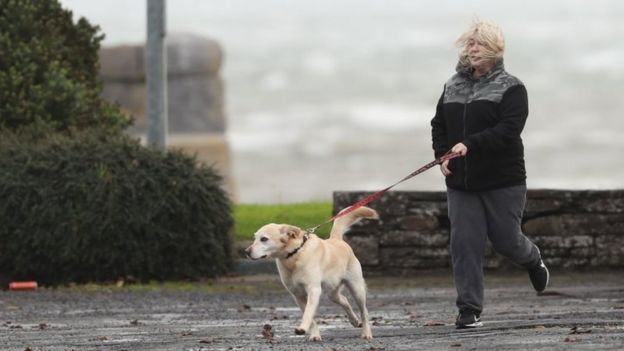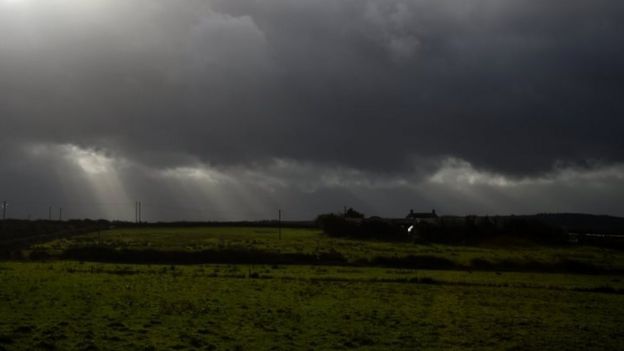Thousands are without power in southern Ireland as the remnants of Hurricane Ophelia reach the British Isles.
The Met Office has warned of "potential danger to life", with winds off the south coast of Ireland reaching 109mph (176km/h) at Fastnet Rock.
In the Republic of Ireland, Met Eireann has issued a red wind warning and the government has deployed the army.
An amber warning for Northern Ireland, west Wales, south west Scotland and the Isle of Man is in force from midday.
The BBC's Ireland correspondent, Chris Page, said it would be the most severe storm to hit Ireland in half a century.
Ophelia is on its way from the Azores in the Atlantic Ocean and it comes 30 years after the UK's Great Storm of 1987.
- Are you affected by Hurricane Ophelia? E-mail your stories and pictures to haveyoursay@bbc.co.uk or WhatsApp: +447555 173285
Ireland's Taoiseach Leo Varadkar said the "dangerous" storm had reached the southern part of Ireland, with trees down and 15,000 people without power.
He said the power will be repaired by ESB Networks when it is safe to do so and advised people to stay indoors until the storm had passed.
- Hurricane Ophelia: Latest updates
- All Northern Ireland schools to close after storm warning
- Amber warning for Scotland
- Great Storm of 1987: The day 18 people were killed
The Met Office said there was a "good chance" Northern Ireland could be hit on Monday afternoon by power cuts, flying debris, large waves in coastal areas and disruption to all travel services.
A yellow warning of "very windy weather" also covers parts of Scotland, the west and north of England and Wales.
Met Eireann meteorologist Joanna Donnelly told BBC Breakfast that "hurricane-force winds" were expected and the "real impact" for the Republic of Ireland will be about midday.
 AFP
AFP
Many ferries, trains, buses and flights across the island have been cancelled.
Dublin Airport said while early morning flights were operating as normal, up to 130 flights are expected to be cancelled when the storm hits later.
Belfast Airport said flights were scheduled to operate as normal, but passengers should check with their airline.
Ryanair, Aer Lingus, British Airways, Qatar Airways, Air France, CityJet, Emirates and KLM have all cancelled some flights due to the severe weather.
 PA
PA REUTERS
REUTERS
Northern Ireland's Department of Education said all schools were closed, in an "entirely precautionary" measure.
All schools and colleges in the Republic of Ireland, where "violent and destructive gusts" are forecast, are also shut.



